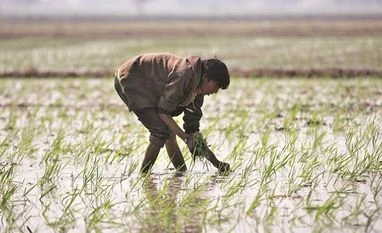The Rs 20-trillion agricultural credit support to the farm sector, proposed in the Union Budget 2023-24, is expected to generate long-term benefits for farm-linked credit financiers and tractor manufacturers in the long-term, analysts said. However, fertiliser players could see limited upside, they added.
"Since fertiliser stocks have more-than-doubled in the last six months, we do not see building blocks for another upsurge," said AK Prabhakar, head of research, IDBI Capital.
The government, on February 1, proposed to expand agriculture credit target by 11 per cent year-on-year (YoY) to Rs 20 trillion in FY23-24. The total fertiliser subsidy, however, was lowered 22 per cent to Rs 175,100 crore for FY24BE (budget estimates) versus Rs 225,200 crore in FY22RE (revised estimates), whereas it was increased 66 per cent from Rs 105,200 crore in FY23BE. While fertiliser allocation for urea was down 14.9 per cent, nutrient-based subsidy (NBS) was down 38 per cent from revised estimates.
"The reduction in subsidies was in-line with the expectation of falling commodity prices, which would translate into lower manufacturing costs of fertilisers. That said, if there is a spike in commodity prices, it could impact the rural or semi-urban consumption demand," said Deepak Jasani, head of retail research, HDFC Securities.
Globally, prices of urea tumbled over 60 per cent to $412 per tonne from $1,050 per tonne, which it had touched on April 19, 2022, while di-ammonium phosphate (DAP) declined 36.61 per cent to $637 per tonne from $1,005 per tonne (touched on April 1, 2022), as per tradingeconomics.com
Analysts at IIFL Securities, meanwhile, remain 'neutral' on the sector, and do not expect any major impact on fertiliser manufacturers as subsidy reduction remained in-line with estimates.
"Although the cut in allocation looks steep (much steeper for NBS) and would be taken negatively for complex players, the government has been supportive of the fertiliser industry and has been revising allocation throughout the year in the past. Hence, we do not take this negatively for the sector," they wrote in a Budget analysis report.
On the bourses, shares of fertiliser companies like Coromandel International, Deepak Fertilisers, Madras Fertilisers, National Fertilisers, and Zuari Agro Chemicals advanced up to 22.4 per cent so far this fiscal year (FY23).
That apart, since the credit outlay for agriculture was increased to Rs 20 trillion and central food grain scheme amounting to Rs 2 trillion was extended by another year, analysts expect this extension to aid rural disposable income and bolster agricultural demand.
"We expect this measure to be positive for public-sector lenders as it will boost agricultural demand and further requirement of agricultural credit. PSU Banks like State Bank of India (SBI), Bank of Baroda, and Indian Bank are likely to be key beneficiaries," wrote analysts at ICICI Direct Research.
Prabhakar of IDBI Capital, meanwhile, believes that micro or gold finance companies like Muthoot Finance, Mahindra Finance, Chola Investment, and Manappuram Finance could benefit from this step in the long-term.
"The increased farm credit activity could also bolster demand for farm equipment, brightening prospects for tractor players like Mahindra and Mahindra (M&M), and Escorts Kubota in the long-term," he added.
In January 2023, M&M's farm equipment sector saw total tractor sales climb 28 per cent YoY to 28,926 units, and Escorts Kubota's agri-machinery business registered a 16.5 per cent YoY rise in tractor sales to 6,649 units.
So far this FY23, shares of M&M and Escorts Kubota have surged 67.9 per cent, and 18.8 per cent, respectively. In comparison, the S&P BSE Sensex climbed 1.9 per cent, during the same period.
Unlock 30+ premium stories daily hand-picked by our editors, across devices on browser and app.
Pick your 5 favourite companies, get a daily email with all news updates on them.
Full access to our intuitive epaper - clip, save, share articles from any device; newspaper archives from 2006.
Preferential invites to Business Standard events.
Curated newsletters on markets, personal finance, policy & politics, start-ups, technology, and more.
)